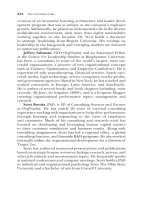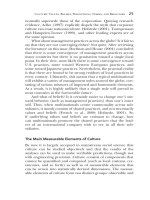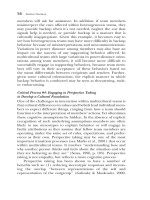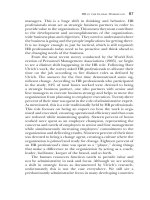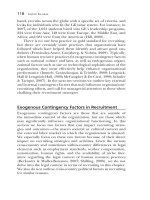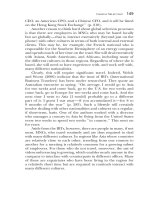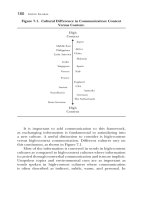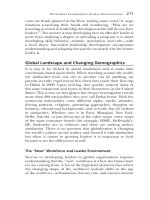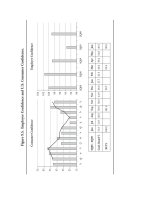Resource governance and developmental states in the global south critical international political economy perspectives
Bạn đang xem bản rút gọn của tài liệu. Xem và tải ngay bản đầy đủ của tài liệu tại đây (3.98 MB, 263 trang )
International Political Economy Series
Series Editor: Timothy M. Shaw, Visiting Professor, University of Massachusetts
Boston, USA and Emeritus Professor, University of London, UK
The global political economy is in flux as a series of cumulative crises impacts its
organization and governance. The IPE series has tracked its development in both
analysis and structure over the last three decades. It has always had a concentration on the global South. Now the South increasingly challenges the North as the
centre of development, also reflected in a growing number of submissions and
publications on indebted Eurozone economies in Southern Europe.
An indispensable resource for scholars and researchers, the series examines
a variety of capitalisms and connections by focusing on emerging economies,
companies and sectors, debates and policies. It informs diverse policy communities as the established trans-Atlantic North declines and ‘the rest’, especially the
BRICS, rise.
Titles include:
Jewellord New Singh and France Bourgouin (editors)
RESOURCE GOVERNANCE AND DEVELOPMENTAL STATES IN THE GLOBAL
SOUTH
Critical International Political Economy Perspectives
Tan Tai Yong and Md Mizanur Rahman (editors)
DIASPORA ENGAGEMENT AND DEVELOPMENT IN SOUTH ASIA
Leila Simona Talani, Alexander Clarkson and Ramon Pachedo Pardo (editors)
DIRTY CITIES
Towards a Political Economy of the Underground in Global Cities
Matthew Louis Bishop
THE POLITICAL ECONOMY OF CARIBBEAN DEVELOPMENT
Xiaoming Huang (editor)
r
MODERN ECONOMIC DEVELOPMENT IN JAPAN AND CHINA
Developmentalism, Capitalism and the World Economic System
Bonnie K. Campbell (editor)
r
MODES OF GOVERNANCE AND REVENUE FLOWS IN AFRICAN MINING
Gopinath Pillai (editor)
r
THE POLITICAL ECONOMY OF SOUTH ASIAN DIASPORA
Patterns of Socio-Economic Influence
Rachel K. Brickner (editor)
r
MIGRATION, GLOBALIZATION AND THE STATE
Juanita Elias and Samanthi Gunawardana (editors)
THE GLOBAL POLITICAL ECONOMY OF THE HOUSEHOLD IN ASIA
Tony Heron
PATHWAYS FROM PREFERENTIAL TRADE
The Politics of Trade Adjustment in Africa, the Caribbean and Pacific
David J. Hornsby
RISK REGULATION, SCIENCE AND INTERESTS IN TRANSATLANTIC TRADE
CONFLICTS
Yang Jiang
CHINA’S POLICYMAKING FOR REGIONAL ECONOMIC COOPERATION
Martin Geiger and Antoine Pécoud (editors)
DISCIPLINING THE TRANSNATIONAL MOBILITY OF PEOPLE
Michael Breen
THE POLITICS OF IMF LENDING
Laura Carsten Mahrenbach
THE TRADE POLICY OF EMERGING POWERS
Strategic Choices of Brazil and India
Vassilis K. Fouskas and Constantine Dimoulas
GREECE, FINANCIALIZATION AND THE EU
The Political Economy of Debt and Destruction
Hany Besada and Shannon Kindornay (editors)
MULTILATERAL DEVELOPMENT COOPERATION IN A CHANGING GLOBAL
ORDER
Caroline Kuzemko
THE ENERGY-SECURITY CLIMATE NEXUS
Hans Löfgren and Owain David Williams (editors)
THE NEW POLITICAL ECONOMY OF PHARMACEUTICALS
Production, Innnovation and TRIPS in the Global South
Timothy Cadman (editor)
r
CLIMATE CHANGE AND GLOBAL POLICY REGIMES
Towards Institutional Legitimacy
Ian Hudson, Mark Hudson and Mara Fridell
FAIR TRADE, SUSTAINABILITY AND SOCIAL CHANGE
Andrés Rivarola Puntigliano and José Briceño-Ruiz (editors)
RESILIENCE OF REGIONALISM IN LATIN AMERICA AND THE CARIBBEAN
Development and Autonomy
Godfrey Baldacchino (editor)
r
THE POLITICAL ECONOMY OF DIVIDED ISLANDS
Unified Geographies, Multiple Polities
Mark Findlay
CONTEMPORARY CHALLENGES IN REGULATING GLOBAL CRISES
International Political Economy Series
Series Standing Order ISBN 978-0–333–71708–0 hardcover
Series Standing Order ISBN 978-0–333–71110–1 paperback
You can receive future titles in this series as they are published by placing a standing order.
Please contact your bookseller or, in case of difficulty, write to us at the address below with
your name and address, the title of the series and one of the ISBNs quoted above.
Customer Services Department, Macmillan Distribution Ltd, Houndmills, Basingstoke,
Hampshire RG21 6XS, England
Resource Governance and
Developmental States in
the Global South
Critical International Political Economy
Perspectives
Edited by
Jewellord Nem Singh
Lecturer in Development, University of Sheffield, UK
and
France Bourgouin
Advisory Services Manager, BSR, Copenhagen, Denmark
ISBN 978-1-137-28678-9
DOI 10.1057/9781137286796
ISBN 978-1-137-28679-6 (eBook)
Editorial matter, selection, introduction and conclusion © Jewellord Nem Singh
and France Bourgouin 2013
Remaining chapters © Respective authors 2013
Reprint of the original edition 2013
All rights reserved. No reproduction, copy or transmission of this
publication may be made without written permission.
No portion of this publication may be reproduced, copied or transmitted
save with written permission or in accordance with the provisions of the
Copyright, Designs and Patents Act 1988, or under the terms of any licence
permitting limited copying issued by the Copyright Licensing Agency,
Saffron House, 6–10 Kirby Street, London EC1N 8TS.
Any person who does any unauthorized act in relation to this publication
may be liable to criminal prosecution and civil claims for damages.
The authors have asserted their rights to be identified as the authors of this work
in accordance with the Copyright, Designs and Patents Act 1988.
First published 2013 by
PALGRAVE MACMILLAN
Palgrave Macmillan in the UK is an imprint of Macmillan Publishers Limited,
registered in England, company number 785998, of Houndmills, Basingstoke,
Hampshire RG21 6XS.
Palgrave Macmillan in the US is a division of St Martin’s Press LLC,
175 Fifth Avenue, New York, NY 10010.
Palgrave Macmillan is the global academic imprint of the above companies
and has companies and representatives throughout the world.
Palgrave® and Macmillan® are registered trademarks in the United States,
the United Kingdom, Europe and other countries
ISBN 978-1-137-28678-9
This book is printed on paper suitable for recycling and made from fully
managed and sustained forest sources. Logging, pulping and manufacturing
processes are expected to conform to the environmental regulations of the
country of origin.
A catalogue record for this book is available from the British Library.
A catalog record for this book is available from the Library of Congress.
Contents
List of Illustrations
ix
Preface
x
Acknowledgements
xiii
Notes on Contributors
xv
Introduction: Resource Governance at a Time of Plenty
Jewellord Nem Singh and France Bourgouin
The new context of resource dependency in the Global South
Extractive capital and economic development
Neoliberalism in the resource sector
The plan of the book
k
Note
1
4
6
8
12
18
Part I Theoretical Debates in
Natural Resource Politics
1
States and Markets in the Context of a Resource Boom:
Engaging with Critical IPE
Jewellord Nem Singh and France Bourgouin
Resource exploitation from systemic perspectives
Global commodity chains research
The resource curse, rentier politics and good governance
Re-engaging with critical IPE concepts
Authority in the global resource economy
Conclusions
Notes
2 Neoliberalism, Mineral Resource Governance and
Developmental States: South Africa in Comparative Perspective
Andrew Lawrence
The spectre of the developmental state in South Africa
The present neoliberal conjuncture
Developmental state theory
Extractive economies in Southern Africa
BEE as substitute for a qualitative approach
Conclusions
v
21
22
26
29
32
35
39
39
40
41
42
43
48
54
56
vi
Contents
Notes
57
3 Citizenship, Democratisation and Resource Politics
Jean Grugel and Jewellord Nem Singh
The resource wealth-democratisation debate
The limits of ‘oil impedes democracy’ thesis
Political economy of development approaches
Resistance politics, natural resources and patterns
of citizenship
Diffusion of codified international agreements
Political incorporation of mining workers
Bringing back politics in resource governance: the role
of citizenship studies
Conclusions: challenges in claiming rights
Notes
Part II
61
63
63
66
69
70
73
77
81
82
Interrogating ‘Good Governance’ in
Resource Management
4 From ‘Good Governance’ to the Contextual Politics
of Extractive Regime Change
France Bourgouin and Håvard Haarstad
d
The good governance framework and the resource curse
The good governance of extractive industries
Good governance policy initiatives
Beyond the good governance criterion
Expanding the analytical scope
Processes of change in extractive politics beyond
good governance
Macroeconomic and ideological trends
Conflict driven governance change
Organisation of social interests
Conclusion: towards a contextual theory of extractive
regime change
87
89
89
91
92
95
96
96
100
102
104
5 The EITI Transparency Standard: Between Global Power Shifts
and Local Conditionality
107
Ana Carolina Gonzalez-Espinosa and Asmara Klein
A sociological approach to the EITI: between norms
and agency
y
108
The EITI and its evolution towards an international standard
for resource-rich states
112
Contents
The challenge of local implementation: a transparency
standard weakened from below
Conclusion
Notes
vii
118
121
122
Part III Neoliberalism, Resource Management and
the Diversity of National Experiences in
the Global South
6 ‘The Chilean Wage’: Mining and the Janus face of the Chilean
Development Model
Jonathan R. Barton, Cecilia Campero and Rajiv Maher
Development and export-oriented production
A ‘Chilean miracle’: development models and mining
policy, 1990–2010
The resource curse of marginalised voices at
the community level
Conclusion: the janus face of mining and dependency
y
Notes
7 Sustainable v. Development? Mining and Natural Resources
Governance in Colombia
Olga L. Castillo-Ospina
Sustainable v. development? A false dilemma
The Colombian environmental policy: between utilitarian
conservationism and environmentalism
Sustainability, extractivism and new-extractivism
Conclusions
Notes
8 Mining Governance in India: Questioning
the Neoliberal Agenda
Matilde Adduci
Reforming mining policies in India under a new paradigm
Combining privatisation and socio-economic sustainability
in the mining sector
India’s mining governance: between developmentalism
and neoliberalism
Bringing power relations back in: Odisha amidst India’s
neoliberal turn
Conclusions
Notes
127
131
134
139
145
148
149
150
154
164
169
170
172
173
176
179
181
188
189
viii
Contents
Part IV
Moving the Debate Forward: The Role
of Critical IPE Studies
9 Conclusions: Shifting Authority in the Age of
the Resource Boom
France Bourgouin, Andrew Lawrence and Jewellord Nem Singh
Changing patterns of state–market relations in
extractive sectors
Depoliticisation, good governance and resistance politics
Taking the debate forward with IPE
Notes
195
196
202
205
209
Bibliographyy
211
Index
237
List of Illustrations
Figures
I.1
6.1
6.2
6.3
6.4
6.5
6.6
6.7
7.1
7.2
7.3
Current resource boom
Copper exports and all mining exports
(percentage by value)
Contribution of the mining sector to GDP
(percentage at current prices)
Electricity consumption in Chile (GWh)
Non-consumptive water use by sector (M3/s/year)
Metal mining production (baseline: 2003 average = 100)
Mining employment, 1992–2011
Hours worked, by principal and sub-contracting firms,
2002–2011
Share of extractive resources in terms of FDI, 2000–2011
Map No. 1: Colombia valid mining permits
(17 May 2011)
Map No. 2: Colombia mining permits application
(1 February 2011)
5
128
129
130
130
133
137
138
158
162
163
Tables
1.1
2.1
7.1
7.2
7.3
8.1
Patterns of political authority
Growth rate of real value added per manufacturing worker,
by country, 1970–1999
Colombian mining production, 2000–2009
(revenues percentage over ten-year revenue)
Mining exports, 1990–2010 (selected years) in
FOB million USD
Growth of Colombian export sectors, 2007–2011
(percentage over previous year)
Sectoral net state domestic product (NSDP) growth rates,
Odisha
ix
37
50
156
157
158
185
Preface
This volume is about the global political economy of extractive industries. More importantly, it offers a fresh approach to theoretical and interpretative challenges that such a complex, diverse and dynamic sector
evokes. On the basis of an array of case studies from across the Global
South, we explore the potential of critical IPE approaches to frame our
understandings of the inter-relationship between resource extraction
and economic growth in the context of development. The edited collection brings together country and regional specialists from a broad range
of social science disciplines as well as those who are interested in natural
resource politics and offers the first step in pushing further novel understandings of resource-based development beyond the narrow resourcecurse approach.
This volume builds its argument on the contemporary dynamics of
the global resources extractive industry as they are manifest in new
geographies of production and consumption, changing patterns of FDI
and plurality in governance practices. The potential of resource-led
economic development for countries of the Global South has been long
debated and is still on-going indeed. Yet, studies which approach this
question while fully acknowledging how the political and economic
structures have evolved, and especially so in the new millennium,
are still relatively scarce. In combination with the detailed cases, this
volume examines the new architecture of global governance of resource
sector management, with the aim of probing into the developmental
potential of mining and oil extraction. It offers a new look at the political economy of resource-led development by setting itself the task of
studying and understanding the complexities of this new system of
global governance in the resources sector, as articulated in the interrelationship of diverse power structures which bind together multiple
actors of influence – both public and private – from the local to the
transnational. However, we depart from existing literature on resource
governance by asking questions that link the IPE of natural resources to
developmental roles of states, democratization and, most importantly,
a political approach to resource management as embedded in global
governance discourses.
It is the ambition of this volume to set the debates into new directions. It does not present a single theoretical outlook in the way of a
x
Preface
xi
new panacea – something to be applied by scholars to come. Rather,
it builds the argument as to why it is important for scholars to adopt
critical IPE approaches when endeavouring to offer new outlooks on
extractive industries and their inherent political complexities. In particular, we recognise that neoliberalism has had variegated effects across
the Global South. This picture is further complicated by sector-specific
dynamics, making it difficult to speak of a discrete set of policy choices
for resource-rich, poor countries. Instead, we present how global governance discourses and practices have shaped the new resource governance agenda in the context of the boom, and consequently, the array
of unique country experiences that allowed some (but not all) to take
advantage of the developmental spaces opened up by the resource
boom since 2003. In other words, our collection opens up the debate
on resource-led development in two significant ways. Firstly, we demonstrate the importance of linking actual changes in the global resources
industry and the intellectual thinking in realising the developmental
potentials of mineral and oil wealth. We posit that the restructuring
of the international division of labour has created both opportunities
and challenges for new and old resource producers alike in transforming
resource wealth into productive capital. Most notably, policy debates at
the international and domestic levels have focussed, inter alia, on how to
minimise rent-seeking, sustain FDI inflows to keep the sector buoyant,
and how states can enhance their accountability in the face of resistance
against mining-based development. Our contributors offer some cues on
how some countries have successfully dealt with these issues, most exemplary being Chile. But equally, they also point to the challenges ahead
as a consequence of the long-term realities of extractive economies.
Secondly, we move the debate forward by interrogating the potentials
and limitations of an ‘IPE of resources’ as an emerging approach to the
resource abundance-economic development nexus. The book, written by
sociologists, geographers, political scientists and anthropologists, collectively expresses the contributors’ concerns regarding the highly economistic approach in the mainstream literature on resource curse which
narrowly defines the politics of natural resources as a function of institutional design or as a problem of rent-seeking and good governance. In
contrast, we suggest that policy reforms are intrinsically political, and,
therefore, the solution to the governance problem rests not so much
on alterations in regulatory frameworks, but on building state capacity.
That is, state capacity as it is negotiated politically among key stakeholders and the assertion of state agency and collective action in the
face of very difficult circumstances. Nevertheless, all the contributors in
xii Preface
this volume see the potential in using extractive resources as leverage for
development, even if this must be done with caution. We suggest here,
emphatically, that policies must account for the intrinsically contested
nature of resource extraction whenever governments make the decision to open their resource sectors to large-scale mining. This implies,
above all, recognising new societal demands for inclusive development,
greater confidence on states as agents of development and the importance of pragmatism in grafting policy reforms. The book is a rather
small attempt to think more creatively about states, neoliberalism and
the challenges of resource-led development.
Jewellord Nem Singh, Sheffield, UK
France Bourgouin, Copenhagen, Denmark
Acknowledgements
This book is the product of a collective effort started in November 2011
by Jewellord Nem Singh of Sheffield University in collaboration with
France Bourgouin, then at the Danish Institute of International Studies
(DIIS) and currently the manager of advisory services at Business for
Social Responsibility (BSR) and affiliate to the Centre interdisciplinaire de
recherche en développement international et société at UQÀM (Université
du Québec à Montréal) (a workshop was organised in Copenhagen, gathering together many international scholars, at senior, early career and
PhD levels). We were both determined to explore the complexities of
the political economy of natural resource extraction in the Global South
today and enrich the debates on the role of extractive industries in the
context of development. Most of the authors in this collection presented
papers at the workshop, and new authors were invited to join the effort as
we sought to develop a book that addressed the main political economy
issues in different geographies and from different scholarly perspectives. While not all papers were eventually included in the final outline,
the disagreements and discussions in the workshop have substantively
shaped our vision and argument, so we owe this to the active participation of our fellow scholars.
At Sheffield, we would like to thank Jean Grugel for her guidance and
for extending to us the facilities of the Sheffield Institute for International
Development (SIID). In Copenhagen, Helle Ravnborg has offered invaluable support in making this project a reality. Our colleagues, including
Joe Turner, have been helpful in polishing the final version of this book
project.
We are grateful to the DIIS for having facilitated the workshop and
to the Lund University Centre for Sustainability Studies (LUCSUS) for
having provided additional financial support. Above all, we are grateful
to the contributors to this book for their enthusiasm and cooperation
throughout the project.
We also express our deepest gratitude to Tim Shaw and Christina Brian
at Palgrave Macmillan’s International Political Economy Series for their
support and patience in this process. We thank the reviewers for their
comments in improving the overall traction of our argument. Amanda
xiii
xiv
Acknowledgements
McGrath was also instrumental in following through the ups and downs
of putting together this edited collection.
Finally, the success of an intellectual project rests both on having a
supportive academic environment and having been blessed with an
understanding family. Crucially, the book was written at a time of transition and immense uncertainty for both editors, and, therefore, it is
of utmost importance to recognise the contribution of our friends and
families in Europe, Canada and the Philippines. Our partners, Aidan and
Patrick, as well as France’s kids have been very patient with us as we
sought for a balance (and continue to do so) between our professional
careers and family life, which oftentimes does not come easily. Without
their love and enduring capacity to understand the stresses in academia,
this book would not have been accomplished.
Notes on Contributors
Matilde Adduci is Lecturer in the Department of Cultures, Politics and
Society at the University of Turin, Italy. She attained an MSc degree
in Development Studies at the School of Oriental and African Studies
(SOAS), University of London, and a PhD degree in Civilization, Society
and Economy of the Indian Subcontinent at the University of Rome ‘La
Sapienza’.
Jonathan R. Barton is Senior Lecturer in the Institute of Urban and
Regional Studies at the Pontificia Universidad Católica de Chile and
is Director of the Centre of Sustainable Urban Development. He is a
geographer, with a PhD in Economic History from the University of
Liverpool, UK. His research interests lie in issues relating to the politics and planning of sustainable development at different administrative scales. Recent work has focused on export-oriented development in
Chile and its impacts on local governance and sustainable development,
particularly in relation to the salmon aquaculture, forestry and mining
sectors. With others, he has published books on political geography in
Latin America, democracy in Latin America and environmental regulations and the globalisation of production. He is on the editorial board
of several environment and planning journals, and has published in
English and Spanish, in journals such as Global Environmental Change,
Globalizations, Journal of Agrarian Change, CEPAL/ECLAC Review
w and the
Revista Latinoamericana de Estudios Urbano Regionales (EURE). He has also
undertaken consultancy work for CEPAL/ECLAC, the World Bank, IDB,
UNIDO and UNCTAD.
France Bourgouin is Advisory Services Manager at BSR in Copenhagen
and affiliated to the Centre interdisciplinaire de recherché en développement international et société (CIRDIS) at the Université du Québec
à Montréal (UQÀM). Over the past 12 years, she has been conducting
research on the political economy of extractive industries, and mining
in particular, and mining policy in a development context. Previous to
BSR, she was a project researcher at the Danish Institute for International
Studies in Copenhagen. Through her research, she has provided mineral
governance and related advice (Corporate Social Responsibility [CSR],
human rights impacts risks, political risk, institutional and regulatory reform) to companies, governments and civil society throughout
xv
xvi Notes on Contributors
Southern and Eastern Africa. She has also conducted extensive research
work in the region on policy liberalisation of extractive industries,
MNC-artisanal mining relations, socio-economic impacts of mining
development, cross-sector collaboration and local procurement. She
holds a PhD in Anthropology from Lund University, completed in
collaboration with EHESS in Paris.
Cecilia Campero graduated as a lawyer from the Universidad Católica
Boliviana, and has a masters in Human Settlements and the Environment
from the Pontificia Universidad Católica de Chile (UC). She is currently
a doctoral researcher in the Architecture and Urban Studies programme
of the UC and holds a Chilean national research scholarship. Her
previous work focused on mining and gas firms and community agreements in the Bolivian context as a researcher on the ‘Negotiating New
Political Spaces’ project financed by the Norwegian research council.
Her current work builds on this previous experience and looks at the
comparative dimensions of extractive industry governance associated
with legal frameworks, spatial planning considerations and community
development in the mining regions of Chile and Bolivia. Legal geography and regional planning constitute the principal research frameworks for this work.
Olga L. Castillo-Ospina is Professor in the School of Environmental
and Rural Studies and member of the research groups ‘Conflict, Region
and Rural Societies” and “Institutions and Rural Development’, all at the
Javeriana University in Bogota, Colombia. She is also a member of the
International Network on Governance of Natural and Mineral Resources
(GNMR). During the past few years she has focused her teaching and
research activities on the consistency (or lack of it) between theories,
discourses and practices of ‘Development’, including one of its most
popular adjectives, such as Sustainable Development. The Geopolitics of
Energy Resources is also among her current research interests. Her most
recent publications include ‘¿Modelos de Desarrollo o de Desarrollo
Rural? Tres hipótesis para la discusión’ in Y. Villagómez and M. Guibert
(Eds) Territorios y Actores Rurales Latinoamericanos – Nuevas prácticas y
Nuevos Modelos de Gestión (2012); ‘Colombia: Not the Oldest Democracy
in Latin America, but Rather a Fake One’ in B. Howe, V. Popovski and
M. Notaras (Eds) Democracy in the South: Participation, the State and the
People, United Nations (2010); Paradigmas y Conceptos de Desarrollo Rural
(2008); and El Desarrollo ¿Progreso o ilusión? – Aportes para el debate desde
el ámbito rural (2007).
Notes on Contributors
xvii
Ana Carolina Gonzalez-Espinosa is Research Associate at Externado
University in Colombia and a PhD student at Sciences Po Paris,
France. She was Visiting Fellow at Columbia University and Pontificia
Universidad Catolica del Peru. Her dissertation analyses extractive
companies as political actors and identifies their role on transparency
and accountability promotion at the local levels. Her research interests include natural resource governance, anti-corruption studies and
social accountability in Latin America. Her recent publications are on
the subjects of resource revenue accountability in Colombia, Left extractivist projects in Bolivia, Ecuador and Venezuela and she is working on
an edited book forthcoming with Externado University Edition. She
previously worked at the United Nations Development Programme
(UNDP), Transparency International Colombia, as a consultant for U4
Anti-Corruption Resource Centre and Revenue Watch Institute.
Jean Grugel is Professor of International Development and Director of
the Sheffield Institute of International Development at the University of
Sheffield, UK. Publications include Democratization (2013), The Politics of
Poverty Reduction (with Mosley, P., B. Chiripanhura and B. Thirkell-White
(2012), Governance after Neoliberalism in Latin America (with Pia Riggirozzi,
2009) and Critical Perspectives on Global Governance Rights and Regulation
in Governing Regimes (with Nicola Piper, 2007). Articles have appeared in
the Journal of European Public Policy, Human Rights Quarterly, Development
and Change, Journal of Latin American Studies, Global Governance, and
Third World Quarterlyy and International Sociology. She was a trustee of the
non-governmental organisation (NGO) Childhope for several years, is a
fellow of the RSA and was elected to the Academy of Social Sciences in
2012. Her research interests lie in the intersection between the political
economy of development and human rights and citizenship, and she has
a particular interest in advocacy by and for vulnerable communities.
Asmara Klein holds a Masters in International Relations from Sciences
Po (Paris), France. She is currently doing her PhD on the transparency
norm in the extractive industry, taking a closer look at the Extractive
Industries Transparency Initiative (EITI) and its implementation in
Cameroon. Her thesis on the NGO coalition ‘Publish What You Pay’
(PWYP) was published in 2010.
Andrew Lawrence obtained his PhD in comparative political economy
and political theory at the City University of New York Graduate Center
in 2003. Since then, he has taught at the Woodrow Wilson Department
of Politics at the University of Virginia, and the School of Social and
xviii
Notes on Contributors
Political Science at the University of Edinburgh, where he also served as
Postgraduate Advisor for African Studies. At present, he is Research Fellow
at the Vienna School of International Studies, where he is completing
a book on global governance. His major areas of research lie at the
interstices of international relations, comparative politics and political
economy. He has written several articles and chapters on comparative
labour movements, the comparative political economy of extraction
and democratisation processes, for the journals Comparative Politics,
Journal of Development Studies and New Political Science, among others;
he also contributes to a blog at the Social Science Research Council –
His book on worker and
employer collective action in Germany, South Africa and the United
States will appear in collaboration with Cambridge University Press in
2013.
Rajiv Maherr has a degree in Tourism Management from Leeds
Metropolitan University UK, a masters in Human Settlements and the
Environment from the Pontificia Universidad Católica de Chile and an
MSc in Research Methods from Cranfield University, UK. He is currently
a doctoral student in the Doughty Centre for Corporate Responsibility,
Cranfield University, UK. His research focuses on community positions and perceptions in relation to neighbouring mining operations in
Chile and Brazil, and is based principally on social movement theory.
In his previous research work, Rajiv focused on CSR and Corporate
Accountability in relation to Chile’s largest firms. He continued to
work on these themes as a consultant with the World Bank Group’s
International Finance Corporation (IFC) and Vincular CSR Centre,
Chile.
Jewellord Nem Singh is Lecturer in Development in the Department
of Geography at the University of Sheffield, and prior to this appointment, was Post-Doctoral Research Assistant in the Sheffield Institute
for International Development (SIID). His main research examines the
global governance of natural resources, pathways of resource-based
development and labour movements and citizenship struggles in
mineral-based societies. His empirical concentration is in Latin America
and Southeast Asia. Articles have appeared in New Political Economy,
y
Third World Quarterlyy and Journal of Developing Societies. He is currently
completing a typescript provisionally titled ‘New Developmentalism
and Resource Politics in Left-led Latin America: Brazil and Chile in
Comparative Perspectives’.
Introduction: Resource
Governance at a Time of Plenty
Jewellord Nem Singh and France Bourgouin
Shortly after the turn of the twenty-first century, the world found itself
in the midst of a remarkable resource commodity boom: investments
and terms of trade in extractive industries were at record levels. The
voracious demand for natural resources of emerging powers, most
notably China and India, as a result of their sustained economic
growth has kept commodity prices buoyant. The boom of 2003 is
unlike any previous resource booms that have occurred since the
end of World War II. The boom of 1950–1960s rested on the massive
industry build-up in response to the Korean War and did not endure
past the next cycle of economic downturn. Likewise, the 1973–1974 oil
boom which was fuelled by widespread harvest failures, the collapse
of the Bretton Woods currency system and OPEC’s market management, tripling the price of oil, reached its nadir as the world economy
entered a protracted era of recession (Radetzki, 2006). The 2003 boom
has proven more durable. Investments continue to pour into resourcerich countries, especially those of the Global South owning significant
untapped mineral, oil and hydrocarbon reserves. What is all the more
striking is that the 2008 global financial crisis has hardly slowed down
the rate of growth and foreign investment in resource-rich states. The
expansion of the sector did not collapse in the face of economic slowdown as seen with earlier booms, and the immediate return of soaring
commodity prices in 2010 has led some commentators to claim that
this resource boom is far from its end.1 The unprecedented nature of
this current resource sector expansion certainly invites us to recast
debates on the politics of natural resources and rethink how we understand the contemporary nexus of neoliberalism, resource extraction
and development in the Global South.
1
2 Jewellord Nem Singh and France Bourgouin
In looking at the expansion of the resource sector over the past
decades, and especially the opening of resource extraction in Latin
America and Africa, the conventional argument goes that in the context
of development, natural resources tend to hinder, rather than promote
economic growth. The phenomenon, which has been overly generalised
given the breadth of low- and middle-income countries discussed, has
been coined the ‘resource curse’. Accordingly, and despite some efforts
to challenge the resource-curse approach, a standardised understanding
of the politics of natural resources has emerged. This is all the more
so when the logics of ‘the curse’ are taken in tandem with a consideration of the hegemonic neoliberal order. The resulting view that is
usually maintained is that weak state capacity in the face of the powers
of transnational capital and the lack of diversity in the structure of local
economies both obstruct the potential for resource-led development in
the Global South. Such logic leaves little room for the potential of the
current economic boom to foster any sort of economic development in
poor countries.
But what these generalised debates thus far have neglected to explore
is how national elites throughout the Global South have responded in
very different ways to the recent investment bonanza. While neoliberal ideology prevailed and regulatory reforms were pervasively implemented, inciting ever higher rates of foreign private investments in
resource extraction, there have nevertheless been different forms of adaptation, resistance and opposition to this hegemonic order that have not
been adequately discussed. The very nature of mineral and oil resources
is such that states have retained some degree of political autonomy in
the neoliberal era. In Latin America, for instance, a resurgent ‘return
of the state’ in managing natural resources has taken place, whereby
regional governments have begun to utilise export taxes for social redistribution (Grugel & Riggirozzi, 2012). Across the Andean countries and
Southern Cone, ‘resource nationalisms’ in varying forms and scope have
challenged long-held views regarding resource ownership and developmental spaces for Latin America to take control of their national resources
(Grugel et al. forthcoming; Hogenboom, 2012a; Nem Singh, 2012a).
This pattern of greater state activism through the intensive and extensive exploitation of natural resources for economic growth and redistribution has been coined as ‘neo-extractivist regimes’ (Gudynas, 2011).
Similarly, many African countries have adopted neoliberal reforms and
opened up their extractives sector at staggering pace, and with a notable
presence of foreign multinational corporations (MNCs). Nevertheless
African states retain ownership rights of the minerals, which has in fact
Introduction
3
sparked tensions between ownership rights (maintained by states) and
extraction rights (conferred to MNCs). This marked tension between
privatised models of resource extraction and emerging resource nationalism also plays out in the Asian context, where a stronger tradition of
developmentalism persists throughout the region (see Hatcher, 2012;
Aducci this volume). In quite different ways, neoliberalism in the Global
South was mediated and resisted, and, therefore, has been implemented
less neatly despite the seemingly hegemonic consensus on free-market
orthodoxy.
If we want to think about pathways upon which natural resource
extraction can lead to inclusive and sustained economic development,
one must recognise the complex nature of the extractive industry.
Accordingly, resource politics concerns the traversing of political
authority simultaneously between spheres of the public and private,
as well as between the local and the transnational. Yet although the
Bretton Woods Institutions (BWIs) promote a singular recipe for good
governance of resources, the specific applications of (neoliberal) institutional frameworks in the extractive industry are, in fact, highly contextualised across the developing world. As spaces of authority shift and
power configurations change in the world economy, the opportunities
and constraints on national development projects are, in equal measure,
changing in different regions.
It is against this backdrop that the book explores the different ways
the contemporary resource boom informs our understanding of the
politics of natural resource extraction in the Global South. Since the
1980s, economic reforms in strategic resource sectors across the developing world have been moulded by neoliberalism. Market-opening
policies were pushed by international financial institutions as an alternative strategy of managing debt, stagnation and lack of investments. In
many ways then, neoliberal reforms were antecedent to the boom, and,
therefore, have helped to set the conditions of opportunity for resourceabundant countries to capture the benefits of massive inflows of mineral
rents. Equally, economic restructuring has accompanied political reforms,
such as increasing demands for greater accountability and transparency
of resource management. Thus while states remain the locus of power
in managing natural resources for development, pressures from above
and below are influencing the reform agenda at the national level. In
this regard, our edited collection provides analysis of how the globalised
resource sector has been transformed not simply by the changing configurations of state-market relations but also the transformation of resource
management at different scales of governance.
4
Jewellord Nem Singh and France Bourgouin
The new context of resource dependency in
the Global South
The specific nature and dynamics of the 2003 global resource boom
make this an appropriate time to rethink our approach to understanding
resource politics in the Global South today. Firstly, the driving force
behind the boom is a complex set of factors linked to structural change
in global and national economies rather than simply resulting from a
demand shock. In addition to strong and sustained economic growth
from China and India, the recent boom was fuelled by the low past
investment in extractive commodities in the last decade of the twentieth century, a weak dollar and the explosion of finance capital as a
way of managing investment funds from commodities (Radetzki, 2006).
However, the demand shock and structural shifts alone cannot produce
high and rising commodity prices; the capacity of producers to respond
to the global demands also prolonged the boom and raised the value of
mineral-producing firms (Radetzki et al., 2008).
Secondly, the recent resource boom has entailed changing geographies of extractive resource supply and demand. Among the emerging
powers, Brazil, South Africa and Indonesia are traditionally resourceexporting states but are increasingly becoming resource-seeking at
the same time due to national ambitions of becoming new industrial
powerhouses in the Global South. Equally, resource-rich Russia and
China – countries with a socialist past but which embraced the pathway
of market reforms – are expanding their scope of operations into new
frontiers of resource exploitation through multinational state-controlled
enterprises. Finally, some emerging resource-rich countries with relatively solid manufacturing industries that complement their resource
sectors, namely Brazil, India and Mexico, contribute to growing market
demands for raw materials. While in the past the commodity boom was
a response to demands of industrialised countries in the United States
and Europe, as Figure I.1 demonstrates, the rebounding of commodity
prices after a global financial crisis in 2008 illustrates the increasing role
of late industrialising countries, particularly Asia Pacific, in sustaining
the global push for resource expansion.
Thirdly, South-South investment driven by multinational enterprises
in the Global South, measured in terms of Southern outward FDI, also
represents a new characteristic defining the uniqueness of the present
commodity boom. Indeed as Goldstein (2007) points out, this trend
presents a challenge to conventional understandings of multinational
enterprises and theories of economic growth. Since the 1990s, there
Introduction
5
Average Prices in USD
250
200
150
100
50
Food and Beverage
10
20
09
20
08
20
07
Agriculture and Raw Materials
Minerals and Non-Ferrous Metals
Figure I.1
20
06
20
05
20
04
20
03
20
02
20
01
20
20
00
0
Energy
Current resource boom
Note: Price index is 2005 = 100.
Source: WTO International Trade Statistics 2011 (adapted).
has been a marked increase in foreign investment outflows from developing countries. In the extractive sector, FDI flows from countries such
as South Africa, India, China, Brazil, Mexico and Venezuela, suggests
that resource-dependent countries of the South are more financially
integrated with one another than was believed hitherto. This trend also
implies that resource-rich developing countries have greater access to
more sources of investment than before. A new geography of resource
extraction that is concentrated in the developing areas isemerging,
therefore, as a result of the neoliberal reforms and commodity boom.
Undeniably, the export bonanza represents a new opportunity for
resource-abundant countries to rethink their models of development.
The task of the book, then, is to explore what resource-led development
means in the context of developing countries, and consequently, to
identify the differing patterns of political authority as countries engage
with boom. This, inevitably, requires paying close attention to dynamics
of power relations between states, on the one hand, and international
financial institutions and private capital, on the other. Crucially, the
authors of the book recognise the unique features of extractive capital,
which in debates about development makes it less comparable to manufacturing, services and industrial sectors. In so doing, they argue that
6
Jewellord Nem Singh and France Bourgouin
countries whose extractive resources constitute their leading sector
possess institutional properties mediated by sector-specific dynamics
that accompany a distinctive set of policy dilemmas.
Extractive capital and economic development
Natural resource capital represents a particular type of capital. Most obviously, it is cyclically prone to windfall booms and busts. Historically,
resource commodities have been subjected to external shocks and sharp
flux in commodity prices, as was seen with the severe contraction of
demands for certain minerals in the wakes of the two World Wars and
the Great Depression (Bulmer, 1994). With global market integration,
commodity prices have increasingly become susceptible to speculation in the international minerals markets, which adversely affect the
production processes (Webb, 1999).
From both an economic as well as a policy viewpoint, extractive
resources’ relative absence of value added together with their price volatility on world markets make them an unreliable source of income for
national governments (Auty, 1993; Humphreys et al., 2007; Sachs &
Warner, 1997, 2001). Moreover, booming resource sectors are believed
to draw capital and labour away from a country’s manufacturing and
agricultural sectors, thereby raising their production costs (Ross, 2001:
305) and leading to the appreciation of real exchange rates caused by
the sharp rise in commodity exports, an observation referred to as the
Dutch Disease. Hence, resource-led development is considered unlikely
as booms fail to bring investments into the more stable and dynamic
sectors of the economy, such as manufacturing, but instead, direct
investment and factor inputs towards the resource sector.
Similarly, the open access exploitation hypothesis suggests that not
only does extraction under open access conditions generate few resource
rents to be reinvested but it also leads to over-exploitation of natural
capital in the long run, thus curbing the development potential of the
resource sector. For others, unfavourable environmental conditions
may directly inhibit the efficient generation of natural resource rents
and sustainable returns through the reinvestment of rents into other
productive assets, as well as indirectly through a long-lasting influence
on patterns of political and legal institutional development (Auty, 2001,
1993; Barbier, 2005, 2003; Easterly & Levine, 2003).
The observed inability of developing states to transform resource
wealth into productive capital over past decades has become the
central preoccupation of economists and political scientists alike, not
to mention of scholars of development. The dominant view is that the

